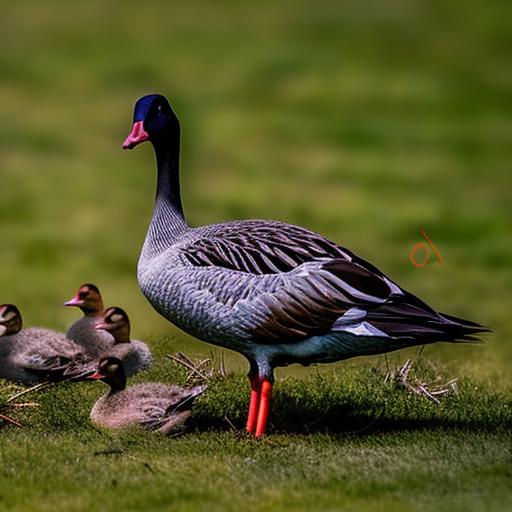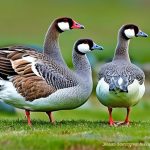Geese invading yards can be a frustrating and messy problem for homeowners. These large birds can cause damage to lawns, gardens, and property, and their droppings can create unsightly and unsanitary conditions. Fortunately, there are effective deterrents that can help keep geese away from your yard. In this article, we will discuss various methods for deterring geese, including physical barriers, sound and light deterrents, taste and smell deterrents, removing food sources, creating an uninviting environment for roosting, planting vegetation that geese dislike, using decoys, educating neighbors, and seeking professional help.
Key Takeaways
- Geese are social animals and tend to congregate in large groups.
- Physical barriers such as fences and netting can prevent geese from entering your yard.
- Sound and light devices can be effective in scaring off geese, but need to be used consistently.
- Taste and smell deterrents such as garlic and hot pepper can make your yard unappealing to geese.
- Removing food sources such as bird feeders and pet food can discourage geese from visiting.
Understanding the behavior of geese
To effectively deter geese from your yard, it is important to understand their behavior. Geese are attracted to areas that provide food, water, and shelter. They are particularly drawn to open spaces with short grass where they can easily spot predators. Geese also prefer areas near bodies of water where they can swim and find food. Understanding their nesting and roosting habits is also crucial. Geese typically nest on the ground near water and prefer areas with tall grass or shrubs for cover. They also roost in areas that provide protection from predators, such as tall trees or buildings.
Installing physical barriers to deter geese
Physical barriers can be an effective way to keep geese out of your yard. Fences, netting, and other physical barriers can prevent geese from accessing your property. Fences should be at least three feet high and have small openings to prevent geese from squeezing through. Netting can be used to cover ponds or other bodies of water to prevent geese from swimming in them. It is important to install these barriers properly to ensure they are effective. Make sure fences are secure and extend into the ground to prevent geese from digging underneath. Netting should be taut and securely fastened to prevent geese from getting tangled.
Using sound and light to scare off geese
Geese are sensitive to loud noises and flashing lights, making them effective deterrents. Devices that emit loud noises, such as propane cannons or motion-activated alarms, can startle geese and discourage them from entering your yard. Similarly, devices that emit flashing lights, such as strobe lights or laser pointers, can create a sense of danger and make geese feel unsafe. These deterrents should be used strategically and rotated periodically to prevent geese from becoming accustomed to them.
Applying taste and smell deterrents to your yard
Taste and smell deterrents can also be effective in deterring geese. Sprays or granules that have a strong odor or taste that geese find unpleasant can discourage them from entering your yard. These deterrents can be applied to grass, plants, or other areas where geese are likely to feed or roost. It is important to follow the instructions on the product label and reapply as needed, especially after rain or watering.
Removing food sources that attract geese

One of the most effective ways to deter geese is to remove their food sources. Geese are attracted to areas with abundant food, such as bird feeders, fallen fruit, or open garbage cans. By removing these food sources, you can make your yard less appealing to geese. Keep bird feeders out of reach of geese or switch to feeders that are designed to deter larger birds. Clean up fallen fruit regularly and secure garbage cans with tight-fitting lids.
Creating an uninviting environment for geese to roost
In addition to removing food sources, it is important to make your yard uninviting for geese to roost. Geese prefer areas with tall grass or shrubs where they can hide from predators. By keeping your lawn well-maintained and free of tall grass or bushes, you can discourage geese from roosting in your yard. Regularly mow your lawn and trim shrubs to make your yard less attractive to geese.
Planting vegetation that geese dislike
Another effective method for deterring geese is to plant vegetation that they dislike. Geese tend to avoid plants with prickly or thorny leaves, as well as plants with strong odors. Examples of plants that geese tend to avoid include holly bushes, juniper bushes, and lavender. By strategically planting these types of vegetation in your yard, you can create a natural deterrent for geese.
Using decoys to trick geese into thinking your yard is already occupied
Decoys can be a useful tool for deterring geese by tricking them into thinking your yard is already occupied. Decoys can be in the form of plastic or wooden replicas of geese or other predators, such as owls or coyotes. Place these decoys strategically around your yard, particularly near areas where geese are likely to feed or roost. Move the decoys periodically to prevent geese from realizing they are not real.
Educating your neighbors on how to prevent geese from visiting
Preventing geese from invading your yard may require cooperation from your neighbors. Geese are not limited to one property and can easily move between yards. It is important to educate your neighbors on the importance of deterring geese and provide them with information on effective methods. Communicate with your neighbors and share tips and resources on how to prevent geese from visiting their yards as well.
Seeking professional help to manage geese populations in your area
If geese populations in your area are out of control, it may be necessary to seek professional help. Professional wildlife management companies have the expertise and resources to effectively manage geese populations. They can provide guidance on the best methods for deterring geese and may offer services such as habitat modification or population control measures.
Geese invading yards can be a nuisance, but there are effective deterrents that can help keep them away. By understanding the behavior of geese and implementing various methods such as physical barriers, sound and light deterrents, taste and smell deterrents, removing food sources, creating an uninviting environment for roosting, planting vegetation that geese dislike, using decoys, educating neighbors, and seeking professional help, you can successfully deter geese from invading your yard. Take action today to prevent geese from causing damage and creating unsightly conditions in your yard.
If you’re looking for effective ways to keep geese off your yard, you might also be interested in learning about the Producers Pride Sentinel Chicken Coop. This innovative coop not only provides a safe and comfortable home for your chickens but also acts as a deterrent for unwanted visitors like geese. With its sturdy construction and clever design, the Sentinel Chicken Coop helps keep your yard free from geese while ensuring the well-being of your feathered friends. Check out this article on Poultry Wizard to discover more about this practical solution: https://poultrywizard.com/keeping-chickens/producers-pride-sentinel-chicken-coop/.
FAQs
What are some common reasons why geese invade yards?
Geese may invade yards in search of food, water, or nesting sites. They may also be attracted to the grass and vegetation in the yard.
What are some effective ways to keep geese off your yard?
Some effective ways to keep geese off your yard include using decoys, installing fencing or netting, using repellents, and removing food sources.
What are some natural repellents that can be used to keep geese away?
Some natural repellents that can be used to keep geese away include planting certain types of vegetation, using noise deterrents, and using visual deterrents such as reflective tape or balloons.
Is it legal to harm or kill geese that invade your yard?
In most cases, it is illegal to harm or kill geese that invade your yard. It is important to check with local laws and regulations before taking any action.
What should I do if I encounter an aggressive goose?
If you encounter an aggressive goose, it is important to remain calm and avoid making direct eye contact. Slowly back away from the goose and give it plenty of space. If the goose continues to be aggressive, seek assistance from a professional wildlife control service.
Meet Walter, the feathered-friend fanatic of Florida! Nestled in the sunshine state, Walter struts through life with his feathered companions, clucking his way to happiness. With a coop that’s fancier than a five-star hotel, he’s the Don Juan of the chicken world. When he’s not teaching his hens to do the cha-cha, you’ll find him in a heated debate with his prized rooster, Sir Clucks-a-Lot. Walter’s poultry passion is no yolk; he’s the sunny-side-up guy you never knew you needed in your flock of friends!







